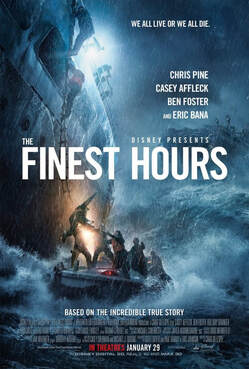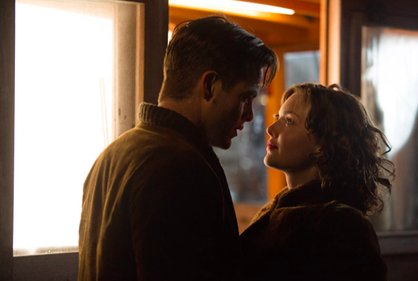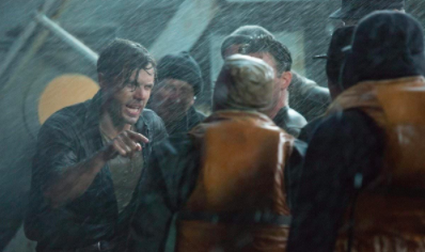
https://www.pluggedin.com/movie-reviews/the-finest-hours/
Whilst researching to find films that would be suitable for upcoming Faith & Film blog posts, I was pleasantly surprised to come across a description of Disney’s The Finest Hours – mistakenly, I must admit. Advertised as a powerful tale of simple heroism, this old-school adventure film surprised me with its many links to the Gospel message, despite the film making little-to-no reference of God, Jesus, or salvation, overall. Nevertheless, the film’s mere existence is very much rooted in Christianity, for one man, Bernard 'Bernie' Webber (Chris Pine), had a faith in God which helped him to weather the most fearsome storm of his life, on the night of February 18, 1952. For when an oil tanker off the coast of Cape Cod, New England, is literally ripped in half, Bernie and four fellow members of the Coast Guard set off on but a small lifeboat, to rescue 33 sailors of the SS Pendleton. In braving the harshest of conditions – 70-foot-high waves, strong winds, chilling temperatures – despite it being practically labelled a suicide mission, they admirably chose to answer the cries of those who were perishing and did not abandon them.
From the offset, director Craig Gillespie and his team of screenwriters establish effectively, the very real dangers faced by those employed within the Coast Guard. On many occasions throughout the film, various characters express fear and trepidation about being able to successfully “cross the bar” – a nautical term used to describe the crossing of sand, which has risen from the bed of a body of water, near to the surface. Such a crossing is incredibly dangerous for any vessel, even when the waters are still. But Bernie, resolute in his mission given to him by his commanding officer, Daniel Cluff (Eric Bana), presses on in commandeering a small motor lifeboat – one that he knows will not improve his odds of success, yet he presses on in the rescue operation. Later, in preparing to head out to sea, Bernie is continually tempted to turn back from his mission by various distractions, including a ringing phone with a call from his sweetheart, and the self-preservationist tendencies of some of his fellow Coast Guardsmen. Even the local fishermen offer some ‘mark my words’ sentiments towards Bernie, informing him that to deceive his commanding officer in pretending that he was unable to breach the bar, wouldn’t be shameful. Bernie, whilst tempted to turn back, for the sake of his own safety and comfort, chooses the harder path instead. He stays resolute in the face of such a trial.
Bernie’s behaviour in these scenes, and throughout the entirety of The Finest Hours for that matter, is consistently Christ-like. His choices aren’t guided by selfish ambition or even honourable pursuits, such as the desire to marry his fiancée – no, Bernie (more than likely) kept in mind what God would have Him to do, which leads him to make choices which honours God first. He follows the Holy Spirit’s leading, from which flows many of its fruits, made visible on screen: “love, joy, peace, patience, kindness, goodness, faithfulness” and “gentleness” (Galatians 5:22-23, NLT).
Bernie also submits to the knowledge that his rescue operation will (most likely) claim his life. He may not have wrestled with his calling just as agonisingly as Jesus did in the Garden of Gethsemane, but Bernie’s facial expressions consistently convey that this isn’t the path he would like to take. Far from it, in fact! Yet he submits completely to the orders of his superior, knowing there is no other way the lives of these men can be saved. Jesus himself knew that to save others there must first be a sacrifice – in His case, an atoning death upon the cross in the place of humanity, to save them. Knowing what he was about to undergo, Jesus cried out to His Father in Heaven: “My Father! If it is possible, let this cup of suffering be taken away from me” (Matthew 26:39, ESV). Even Jesus, the Son of God, who was sent to earth to complete the most important saving act of all time, struggled with His calling, for He became a man in the flesh (whilst also remaining as God) who would naturally express the human desire to avoid intense suffering. But He knew that there was no other way in which His task could be accomplished, for “everyone has sinned” (Romans 3:23, NLT) and therefore nobody is innocent in the eyes of a holy God. But Jesus is perfect – completely devoid of sin and fully able to take our sin upon himself and then to the grave, which destroys its power forever. Jesus did this for you and me, but it did not kill Him in the eternal sense – He rose again three days later, for He is infinitely more powerful than the powers of darkness. However, humanity isn’t – it cannot survive death to sin. But Jesus can – He’s beaten it and paid the price of death for our sin so that we might be able to walk blamelessly into eternal life with God and away from eternal, spiritual death: “For God made Christ, who never sinned, to be the offering for our sin, so that we could be made right with God through Christ” (2 Corinthians 5:21, NLT).
In one exhilarating and genuinely terrifying moment, Bernie and his fellow crew mates’ vessel is completely submerged, due to a gigantic wave, which results in the loss of the lifeboat’s compass. The crew begin to lose heart, suggesting that they turn back since it’s a miracle they’ve stayed afloat to this point. Bernie, however, can’t believe what they’re saying and is determined to press on for the sake of those men who cannot save themselves. He may have lost his physical compass, but the determination to follow his God-centred, moral compass, remains. And for Bernie, this means going out into deep, choppy waters, because he knows that each human being’s life is precious and of value to God. From scripture, we know that God is constantly and tirelessly a pursuer of all people who are lost and in need of being found – the Shepherd who tends to His flock and is the rescuer for our souls! In John 10, Jesus refers to himself as the Good Shepherd and says: “I have other sheep…that are not in this sheepfold. I must bring them also. They will listen to my voice, and there will be one flock with one shepherd” (John 10:16-17, NLT). This indicates that He longs for all men and women to come into life-saving relationship with Him – to be united with Him in Heaven, after they die: “(The Lord is) not wanting any to perish, but all to come to repentance” (2 Peter 3:9, NRSV).
So, Jesus, in dying for humanity, displays that He is our Good Shepherd, for all to see, for all-time. And since He wishes to pursue God’s creation, just as the shepherd pursues the lost sheep, all have value and are worth saving. Bernie, having grown up with a father who was in fact a reverend, was likely to have been aware of this – especially since he didn’t believe that any one of those men should die, but that all were worth saving. And we can take heart in knowing that today, the Good Shepherd believes that you and I are worth saving too – we need only look toward the cross to know that He has pursued us, and upon accepting Him into our lives, will return us to His family, the flock. For whilst the journey to saving the remaining men aboard SS Pendleton was tough, Bernie did the right thing and succeeded. Similarly, going to the cross was exceedingly difficult for Jesus, but He ultimately chose the will of His Father, over His own: “I want your will to be done, not mine” (Matthew 26:39, ESV). He sought out humanity, though we found ourselves in danger, and provided our means of rescue – not giving us the promise of a lifeboat which can sink, but the certain promise of eternal life for all who live in friendship with Him.
Why not prayerfully invite a friend or family member who doesn’t yet know Jesus, to watch The Finest Hours for themselves? Use the film’s themes to ask them what they thought of the film, if they spotted any links to Christianity and what they might think of the Gospel’s response to this subject.
Ask them what they would have done if they found themselves in the same position as Bernie and his fellow Coast Guardsmen. Would they have risked their lives to save those men, despite the odds being stacked against them? Or would they have conserved their resources, knowing that the task was practically impossible? Use their answers as an opportunity to share about Jesus and His mission to save humanity, sharing that even though it was uncomfortable and painful for Jesus to go through that process, He did it because of the value which His Father, God, has placed upon humanity. Also, ask why they think Bernie was so committed to saving the crew of the sinking ship – use this as an opportunity to speak of the value that the film, and Jesus, place on human life.
Take the opportunity to share the hope of the Gospel message with them, encouraging them in the knowledge that even though humanity is lost in their sin, God has made a way for us to be found in Him, and lead us into new life today, through His son Jesus Christ, who offers salvation to all who call upon Him. So, why not invite them to turn from their sin, and receive Him for themselves, today?
Prior to watching the film for yourself, however, take a moment to pray that God would speak to you through the show. If you feel comfortable, pray this prayer over all your future, film-watching experiences:
Dear Lord, as I watch this film, I ask that you would be present here with me. Highlight to me anything within it that is honourable, anything that can be used in conversation for your Kingdom purposes. Amen.
The Finest Hours is currently available to stream on Disney+ (U.K.)



 RSS Feed
RSS Feed